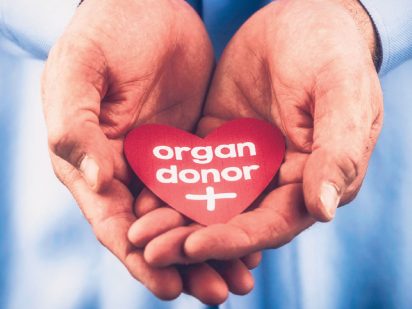In North Dakota, there are 148 people on the waiting list for an organ transplant. On a larger scale, there are 3,318 people in the tri-state area (North Dakota, South Dakota, and Minnesota) and overall, 107,938 people nationally in need of a lifesaving organ.
While 2019 was a record-breaking year, last year ended up being the second highest year for this area, explained Mark Ellingson, MDiv, BCC, a Clinical Hospital Coordinator with LifeSource, an organ procurement organization that serves more than seven million people in the Upper Midwest.
While 2020 started off slow, especially with concerns about non-essential staff being within the hospital walls, “the rebound into the summer and on, the year got to be the second highest,” Ellingson said.
In addition to a heightened awareness of going into hospitals, Ellingson noted that a number of potential organ donors who died in the past year died from COVID-19 or COVID-related illnesses, which made them exempt from organ donation.
“We certainly lost people that were designated donors,” Ellingson said, noting that if the deceased donor had COVID within the last 28 days of their life or were currently COVID-19-positive at the time of their death, they could not be an organ and/or tissue donor. (Ellingson stressed the importance of getting vaccinated for COVID-19.)
In 2020, the most likely to be recovered organ – and the most needed organ to be donated – was the kidneys, Ellingson said. “A donor can offer two of them. Also, living donors can offer one of their two. That’s not uncommon anymore, where someone donates to someone they know, or if the need is there.”
Additionally, other organs frequently donated are the liver, heart, lungs, pancreas, and even the intestines, although “that’s fairly rare,” Ellingson said.
Organ donation, in general, is very rare. Only
one percent of people who pass away have that opportunity to donate their organs. A variety of factors must align, including dying at a hospital on a ventilator, passing a variety of medical tests, and being free of active cancer.
At Trinity Health, guidelines are followed to try and recover as many life-saving organs as possible. When a patient meets the criteria to be an organ or tissue donor, Trinity Health calls LifeSource, whose personnel determines if the patient may or may not be a potential donor. If the patient does meet criteria for donation, LifeSource will reach out to the family to discuss the donation process.
This process has remained the same during the pandemic, Ellingson said, although he noted that there has been “more monitoring from a distance” during the pandemic.
“When COVID was very active, we were very careful about sending people on site, for our sake and the hospital staff’s,” he added. “We moved to do much more virtual work,” which included speaking to hospitals “from a distance and coming on site when needed.” That has since changed, and LifeSource staff are able to enter hospitals again.
If the patient has requested to be a donor or the family wishes to offer donation, LifeSource will then come into the hospital and start the donation process.
Making your intentions known is as easy as a notation on your driver’s license – the commonly accepted legal expression of your wish to donate. However, it is wise to share your decision with family members to ensure that they will support and honor your choice.
It is important that if a person wishes to be an organ donor that they register officially as one.
Having “Organ Donor” on your driver’s license is the most recognized form, nationally, of being on the organ donor registry. This makes it easier for family to make the decision when it comes to it. “That’s the first thing that gets checked,” Ellingson said. (North Dakota residents can also register online at www.life-source.org/register.)
If you are considering organ donation, perhaps you’ve wondered about ethical or religious viewpoints. Most major religions support organ donation as a noble and compassionate act. Other religions view donations as a matter of personal choice. (The viewpoints of many religious organizations are available at www.organdonation.org.)
Every person waiting for an organ transplant is registered with the United Network for Organ Sharing (UNOS). When a family gives its permission for organ donation, UNOS runs a computerized list of potential recipients in order to find a match. Organs are distributed based on factors such as medical urgency, compatible blood and tissue type, body size, and the length of time on the waiting list. All of the expenses related to organ donation are covered by LifeSource and passed on to the recipient and their insurer. Organ donation is a gift that saves and enhances the lives of many. Make a commitment to be a donor and share those wishes with your family.
If you are interested in learning more about organ donation, call the LifeSource central office at 1-888-5DONATE, or go online: www.life-source.org.

